- Home
- Penelope Lively
Next to Nature, Art Page 3
Next to Nature, Art Read online
Page 3
There is one other person who should perhaps be mentioned: Jason. Jason is merely there. He does nothing, all day. From an adult point of view, that is.
Thus, this morning, all over Framleigh, people create.
Sue sits in Toby’s workshop and scowls in concentration at the easel. She feels – not like herself at all, really. Elated, translated. Like after a drink. It is not so much what she is doing – about which she has grave doubts – but being in here at all. With Toby’s things on the walls all around: the lithographs and the new suite that is a dream sequence based on The Waste Land. “What do you think of it?” Toby had asked and she’d blushed scarlet and said she thought it was super, all those marvellous spirals, the way it sort of led you on … And Toby had laid a hand on her arm and said, that’s sweet of you, my dear, and now let’s see what you can do, why don’t we put you here, where the light’s good … And so here she is, bathed in Framleigh light, her blonde baby-fine hair curtaining her face, her heart running a little fast, drawing. Out of this world.
Mary Chambers is painting the Filipino girl. She notes the problems presented by the texture of the hair, and labours to resolve the difficulty. She is having trouble also with the angle of a knee, and presently tears off the sheet and begins again. Paula’s fun-sculpture of a chicken wire and dayglo paint Harlequin keeps catching her eye, and bothers her. She cannot for the life of her find in it anything to admire, and this, too, worries her. Determinedly, she stares at the Filipino girl, who fidgets and yearns for release.
Keith Harrap also paints, though he finds his concentration wandering and thinks the session goes on a bit long for his taste. He decides to try something a bit more material tomorrow: this plaster of paris business maybe, or the fiddling around with wire and flex.
Bob says to Tessa, “How about a jar in the village pub tonight?”
Jason, meanwhile, goes about his own business. He has a friend, Kevin, in tow, who comes up from the village. Kevin is chunky and dark-thatched and looks a miniature version of the burly sensible Warwickshire builder he will one day be. He follows, rather than accompanies, Jason, and falls in with Jason’s arrangements. He talks to no one except Jason and observes Framleigh out of the corner of one eye with disbelief and faint mistrust. He is shocked by the absence of a television, suspicious of the food, envious of the fish-ponds and climbable trees, and contemptuous of Toby, Nick, and Greg, who seem to him a right soft lot. He approves of Bob. Paula is so alien, so unlike any other woman he knows, that she might as well be a Martian and he gives her a wide berth. Once, encouraged by Nick and Toby, he got stuck into some paints and produced a wonderfully flamboyant portrait of his family, lined up outside their council house: Mum, Dad, Paul, Sharon and the budgie, all beaming away under a sunny sky in a garden blooming with flowers, washing and a big spotted football. He was embarrassed, though, by the praise that was showered on this effort, which seemed to him neither here nor there, and did not take it home, as was suggested.
Jason and Kevin cross the prospect, leaving a wake of crushed grass. Thigh-high in greenery, dappled with sunlight, dawdling brown-limbed through the sleepy morning, they seem an image of idyllic childhood: a long ago photograph, a scene from the cinema of sensibility, a commercial for Danish bacon. They arrive at the edge of the woodland, and vanish into the undergrowth.
Jason produces three mangled cigarettes from his pocket, and a box of matches. He says, “You can have one too if you want.”
Kevin, who has never had a bash at this particular activity, but is not going to let on, eyes him. “Where’d you get ’em?”
“Out of Bob’s pocket.” Jason lights up, with care, and puffs.
“Make yer sick.”
“Bob isn’t sick. Nor’s any of them.”
“I done it once,” says Kevin casually. “S’not up to much.”
Jason, who is inclined to agree, holds the cigarette close to the back of his hand to feel how hot it is. Bored with it, he buries it in a pile of dirt. He strikes matches, one by one, and drops them just in time, as the flame creeps to his fingers.
Kevin, otherwise nurtured, watches in horror and in fascination. “Don’t your mum tell you never to do that?”
Jason, who honestly cannot remember Paula’s policy on the matter, if any, grunts. He tempts providence a little too far and burns a finger. The grunt turns to a squeak and he sits licking the finger. Kevin’s look of anxiety is tinged with smugness. “You shouldn’t mess about with them. Matches aren’t toys.”
Jason, examining a pink finger, catches the alien tones of Kevin’s mum and scowls. “Balls,” he says, in retaliation.
Kevin blinks. Half a mile away, his mum comments once again. Sidestepping the matter, he rolls onto his stomach, shunts himself backwards into the bushes and machine-guns Jason, who drops dead. Overhead, a warbler joins the orchestration of wood-pigeons, tits and a robin. The whole place sings, joyously; shafts of sunlight sift down through the leaves; flowers turn lovely vacant faces to the bees. Jason rises, and dies again. And again.
After lunch (one of the simple country meals promised in the brochure, though the home-baked bread is, Mary Chambers rather suspects, from the nearest supermarket and the local cheese is in fact processed Cheddar) the course members disperse to spend the afternoon according to inclination. Some of the younger ones, setting off in search of the swimming-pool which was also promised, are a touch disappointed to come across it eventually tucked away beyond the kitchen garden and empty but for a deposit of green scum. The pool was in fact installed in the nineteen twenties in response to the requirements of the period, and has been derelict this many a long year. However, they agree, you can’t have everything, and, as Sue exclaims: just look at those roses! And, yes, the roses are indeed a sight – Madame Zephirine Drouhon and Etoile d’Hollande and Mermaid, sprawling in uncurbed munificence over the ten foot brick walls that form an L-shaped enclosure to the pool. Sue tucks an Etoile d’Hollande into the cleft of her T-shirt, not knowing quite what she is about, but feeling still a little heady.
Eventually they find the croquet set and play around with that on the only piece of shaven grass, at the centre of the gravelled sweep in front of the house. It is not quite large enough to be satisfactory.
The Framleigh faculty appear to have vanished, except for Nick who sits uneasily on the terrace, reading and looking up from time to time at the windows.
Mary Chambers goes back to Paula’s workshop, to inspect her painting. She finds it unsatisfactory, and takes a sketch block outside. Wandering around, she comes upon the cascade at the start of the woodland ride and decides to have a go at that. The cascade no longer cascades, but is green and mossy and of tricky texture. She settles happily for the next couple of hours.
Toby, in fact, is in his room with migraine, a not uncommon event on the opening day of a course. Nick, presently, comes up and stands uncertainly at the foot of the bed. “Should I tell that girl to stop hoovering, Toby?”
“No, don’t bother. You can turn the blasted collared doves off if you like. Monotonous bloody racket.”
“Collared doves?”
“Birds, to you. Never mind.”
“I wish I could do something.”
“Not to worry. It’ll go. Things do.”
Nick hovers. “Shall I just leave you alone for a bit?”
“You do that.”
Paula and Greg are working together on a recording session in the disused billiard room. Greg sits on a kitchen chair against a background of draped hessian. His right leg is over his left knee and he stares rigidly and expressionlessly at the camera, wielded by Paula.
“O.K.” says Paula, “I’m ready if you are. Shall we go?”
Greg nods.
There is silence, except for the whirr of the camera. One minute, a minute and a half. Paula shuts off the camera and says, “I thought we were going to start?”
“I did start,” says Greg. “That’s part of it.”
“Oh Christ! Sorry. I’
ll start again.”
The camera whirrs once more. Two minutes. Greg uncrosses his legs and puts the left over the right. He says “Shit”.
Paula looks up, a trifle peeved. “What?”
“O.K.” says Greg wearily. “Cut again.”
Paula puts her hand to her forehead. “Christ, sorry Greg. I didn’t realize you’d begun. God, I’m just not with it today.”
She resumes filming. The opening sequence, this time, is prolonged to two and a half minutes. Then Greg says “Shit”. He stares blankly at the camera. After a further fifteen seconds he continues, conversationally, “He was a shit, you know”. This is followed by a sequence of rapid speech during which Greg leans forward to address the camera more intimately. “I’m telling you, my father was a shit. Like, there was no way we could ever talk to each other. We were in a conflict situation right from the start. O.K. – so it’s a standard set-up but what I’m trying to figure out is …” He continues along these lines for eight minutes, before attempting to draw some conclusions. “… I was like messed up through and through by the time I was fifteen, right? A piece of human wreckage, that’s me. So the next ten years I try to work it out one way or another, get myself straight, find out who I am. I go through college and all that time my life’s so much crap. I don’t see how there’s any way I can get myself out of it. And then I start writing and it begins to come together. At last I’m getting it together. I realize that art is cathartic, it’s got to be …” There is a pause, during which Greg may or may not be thinking, after which he continues for another five minutes and comes to an abrupt stop. Paula raises her eyebrows in query. Greg nods and she shuts the camera off. Greg rises and stretches.
“That was fantastic, Greg. It went really well today.”
“I’m reckoning on having the text printed, of course.”
“Of course. The bit about your early work was marvellous. Actually it was just how I felt when I first got into sculpture, that wonderful feeling that now at last one was …”
“Right,” says Greg. “What about the final section?”
“It was great. It’s the directness that’s so marvellous. And the way you sort of don’t quite say things.”
“It’s what I’m all about,” says Greg simply.
In the late afternoon course and faculty are re-united for another spell of studio work before dinner. Toby’s migraine has persisted so Nick supervises his group. Sue, who has waited in a ferment to see Toby’s stooped figure come in at the door, feels her stomach plummet in disappointment: another two hours is too long to go … Nick looks at Mary Chambers’ sketch of the cascade and sees to his surprise that it is good; he tells her so, nervously, not knowing if this will be all right with Toby, and Mary is equally surprised.
There is much chatter and banter at supper. Everyone knows everyone else by now; alliances have been formed; hair is let down. Toby does not appear but it is said that he will be coming later. There is a tension between Keith and a rather garrulous elderly doctor both of whom dive for the vacant place beside Paula, but Paula herself deftly sorts this out by shifting further down the table so that both can be accommodated. Keith wants to have a quiet talk to her about life in general and the ways in which he feels he is not properly fulfilling himself; the doctor wants to hold forth about Art. Paula, in the event, keeps both of them quiet by talking at length of her work and where it has come from and where it is going and the hang-ups that have prevented it getting further. She is wearing a great deal of cream-coloured cheesecloth and her long thick hair is kept back with a flowered cotton scarf. She talks and talks and Keith silently compares this world with his own, in which the women of the profession dart around in white overalls and are crisply efficient with formulae and figures. He becomes even more convinced that he may have made the most ghastly mistake, way back.
Greg sits at one end of the table and is terribly nice to everyone. He remembers all their names and uses them frequently. In fact he contrives to make each one feel that they are the person he most wanted to talk to; he speaks of the problems of his profession and the literary scene both sides of the Atlantic and his place within or rather without it and impresses all with his fluency and wit.
Nick is opposite Mary Chambers. He is worrying about Toby and how Toby feels, or, he fears, doesn’t feel about him and at first can think of nothing to say. But she asks him about his work and presently he is talking about how he would like to go into design and the funny thing is she has some really rather sensible things to say, suggestions to make; she doesn’t seem, on the face of it, that kind of person. She wonders if he gets much chance to work here, at Framleigh, and Nick finds himself explaining how he is always meaning to ask Toby … but somehow … and of course Toby needs him to do other things. She listens, and the large not very expressive eyes watch; they have a way, Nick thinks, of watching beyond what has actually been said, as though they saw round corners. He emphasizes how awfully kind Toby has been, really; that seems necessary. She nods.
After supper there is Nescafé in the Common Room and then Greg gives a poetry reading. He reads some Ginsberg to start with but soon drops that for his own stuff. The course members listen with attention, realizing that they are being offered a rather special experience; some of the poems, as Greg explains, are still in draft form so there is an opportunity to observe the creative process at work. He reads six drafts of one, minutely different. Some of the audience cannot quite follow it.
Mary Chambers follows Greg’s poems, up to a point. They are all about Greg. This is interesting, but also only up to a point. Mary doesn’t want to be nasty, but she hasn’t actually so far found Greg all that interesting. Pleasant enough, but in a way a bit ordinary, though she supposes that as a poet he can’t really be. And also she has a feeling that poetry ought to make you look at things differently, whether it be feelings or the world or an idea or whatever. It should open things up. Greg’s, insofar as it is that straightforward, is clamped inside his own head.
Keith Harrap has the odd doubt, also. But he can see from Paula’s rapt expression that she admires, so he doubts his own doubts, which is unsettling.
Toby slips into the room at some point, unnoticed until gradually people realize he is there, sitting arms folded on a window-seat. Sue goes hot and cold all over.
Bob is not present. Neither is the dark jumpy girl, Tessa.
The reading, eventually, ends. Paula says she has some sorting out to do in the kitchen and goes off, having warmly wished everyone goodnight and hoped that they feel Framleigh up to expectations. There are suitably warm murmurings in response. Toby also leaves, followed after a few minutes by Nick, and so presently does Greg, after giving instructions about switching off lights and shutting doors.
Those course members who are left sit on for a while, chatting. The chat, for the most part, focuses on Framleigh. Jean Simpson reiterates her admiration of the family feel that there is here. Others, more sceptical of the pleasures of family life, extol the apartness of it all, the sense of being somewhere special, the detachment from the real world. I mean, someone says, outside, in real life, you feel everything’s a muddle, everyone’s out for what they can get, it’s me all the way. Here, they’ve got a sort of perspective, know what I mean? Theŕe’s things beyond just people that are important. Right?
Words like order and synthesis and integrity are handed around. And alienation, the times being as they are. It is agreed that the Framleigh people are into all or most of these, depending on the value accorded to whichever concept by whoever is speaking.
The chat becomes more desultory. They go to bed.
Sue lies in the Habitat bed in Room Five on the first floor corridor and thinks of Toby. She wonders where Toby sleeps. At the top of the small flight of stairs by the refectory is a door marked PRIVATE; through this door she has seen pass, at different times, Toby, Paula, Jason, Nick and Greg. In her head, now, she passes through this door herself, ectoplasmic, indifferent to the resistance of wood
and fact, and then through another. She stands at the foot of a bed in which Toby lies wearing – no, not wearing pyjamas – reading … reading poetry. Not, as it happens, Greg’s poetry.
He looks up. “I thought you’d come,” he says. He pulls back the sheet, his eyes on her face. “Get your things off. I’ve been waiting.” Slowly, she peels the jeans down over her thighs.
Tessa, stumbling with Bob through the darkened park, steps in a cow-pat and is too chagrined to mention the matter.
Toby, a furled copy of The Times under his arm, looks in on Paula to complain about a dripping tap in the bathroom. Paula, sitting up in bed filing her nails, peevishly returns the blame. She adds that those girls in the kitchen are being bloody-minded, they want more money. “They can’t have more money,” says Toby. “It simply isn’t on. There isn’t any, apart from anything else.”
Paula replies that in that case he can tell them himself. Toby pads away to his own room where he gets into bed, switches on the bedside light and turns to the property page of The Times.
Chapter 3
Jason, at six-thirty in the morning, wakes, blinks, and arises into instant activity. He trampolines upon the bed, then, bored with this, picks slivers of paint from the battered woodwork of the window-frame. He sees, outside, trees waist-deep in mist, sunshine in swirling shafts. Flights of birds.
He patters across the corridor to Paula’s room. He quietly turns the handle and peeks round the door. Paula and Greg are in the bed having what he supposes to be some kind of fight, which seems a bit funny since he thought they were best friends. Paula said they were, once. But the heaving bedclothes do not that much interest him and he goes away.

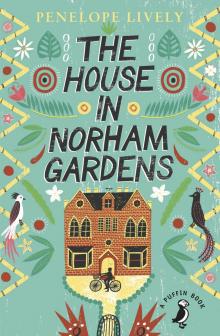 The House in Norham Gardens
The House in Norham Gardens Family Album
Family Album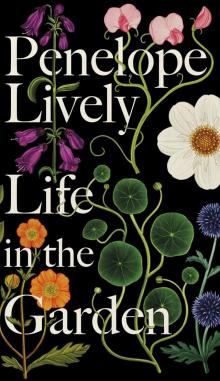 Life in the Garden
Life in the Garden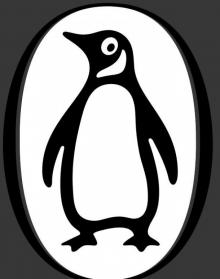 Oleander, Jacaranda: A Childhood Perceived
Oleander, Jacaranda: A Childhood Perceived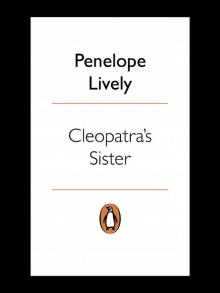 Cleopatra's Sister
Cleopatra's Sister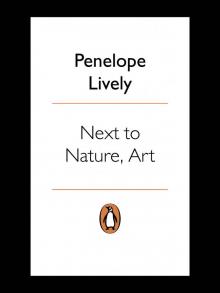 Next to Nature, Art
Next to Nature, Art A Stitch in Time
A Stitch in Time Moon Tiger
Moon Tiger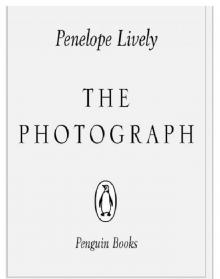 The Photograph
The Photograph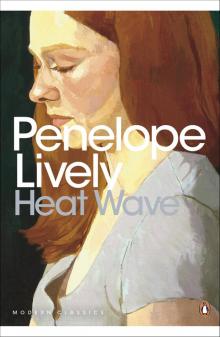 Heat Wave
Heat Wave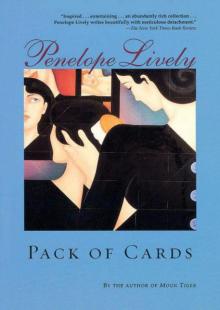 Pack of Cards
Pack of Cards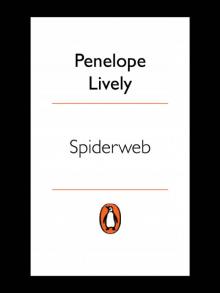 Spiderweb
Spiderweb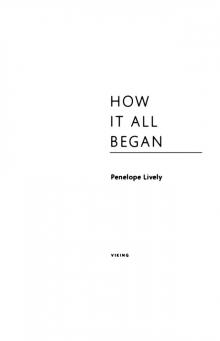 How It All Began
How It All Began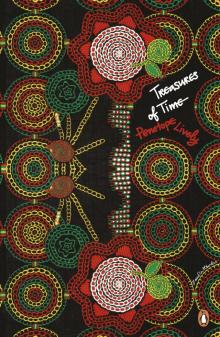 Treasures of Time
Treasures of Time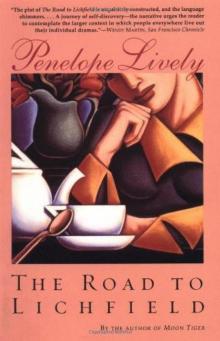 The Road to Lichfield
The Road to Lichfield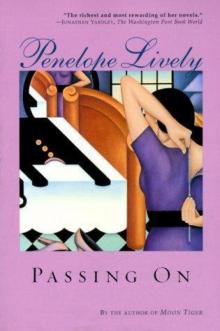 Passing On
Passing On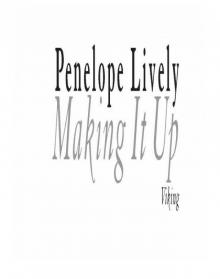 Making It Up
Making It Up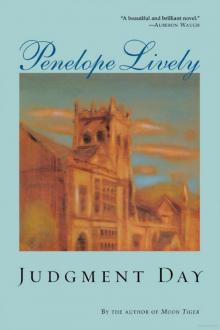 Judgment Day
Judgment Day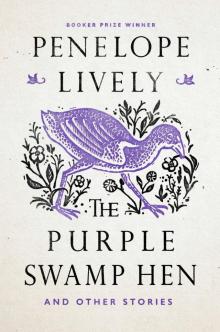 The Purple Swamp Hen and Other Stories
The Purple Swamp Hen and Other Stories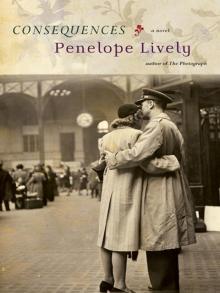 Consequences
Consequences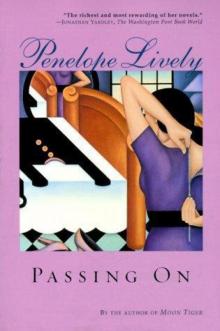 *****Passing On*****
*****Passing On*****